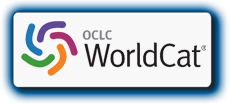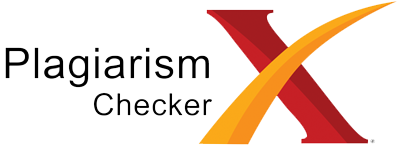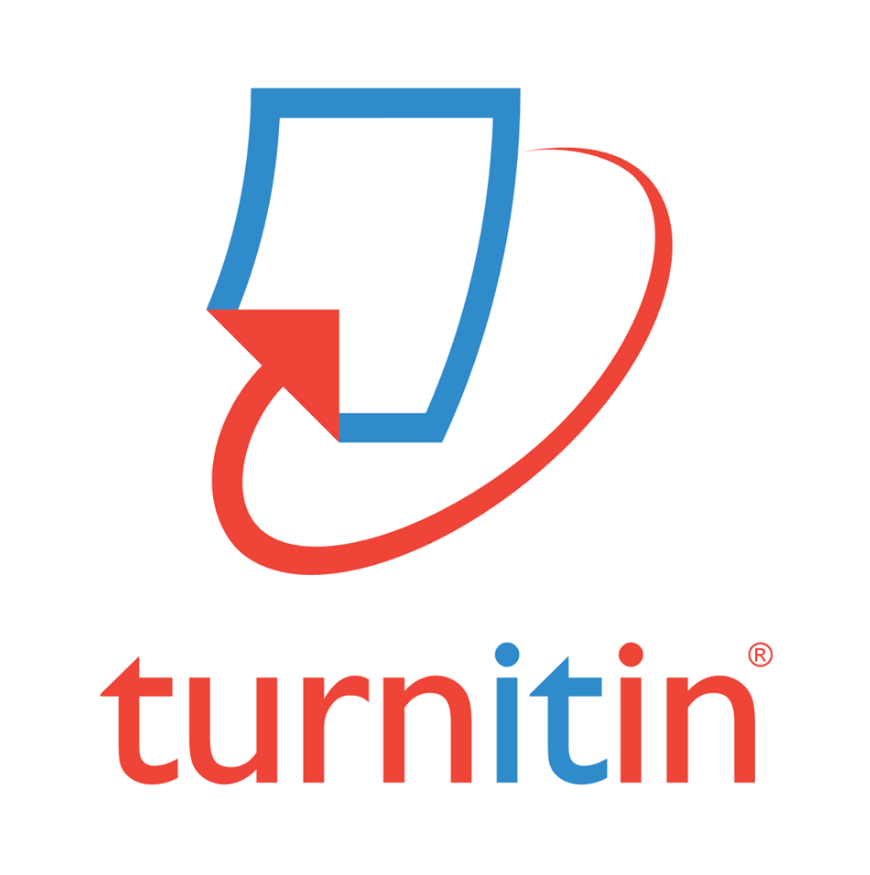Evaluating Students’ English Writing Project through Pear Deck
Abstract
Abstrak
Menulis merupakan salah satu keterampilan belajar bahasa yang paling penting, terutama menulis dalam bahasa Inggris. Hasil tulisan siswa atau mahasiswa dapat dinilai secara manual atau elektronik. Pear Deck merupakan platform pembelajaran digital yang memungkinkan siswa atau mahasiswa belajar secara digital dan membantu pengajar dapat dengan mudah mengevaluasi tulisan peserta didiknya. Namun, penelitian tentang kegunaan Pear Deck belum menemukan hasil yang menyimpul sehingga dalam penelitian ini, penulis bermaksud untuk menganalisis bagaimana Pear Deck dapat dimanfaatkan sebagai pendekatan pembelajaran yang efektif untuk menilai tulisan siswa. Penulis menggunakan metodologi kualitatif dan objek kajian ini diambil dari tulisan 15 mahasiswa President University, Indonesia jurusan Komunikasi. Sebagai pendukung lainnya, data dikumpulkan dari situs resmi Pear Deck, publikasi jurnal, dan prosiding konferensi. Penulis menerapkan teori Penilaian Bahasa: Prinsip dan Praktik Kelas dari H. Douglas Brown dan konsep Discourse Analysis dalam konteks pendidikan. Studi ini menunjukkan bahwa Pear Deck adalah salah satu pilihan yang efektif untuk menilai kemampuan menulis mahasiswa khususnya dalam konteks penulisan cerita berbahasa Inggris. Selain itu, Pear Deck juga memiliki tampilan visual yang menarik yang membuat mahasiswa memiliki rasa ingin tahu yang besar tentang jenis aktivitas selanjutnya. Aplikasi ini juga memberikan fitur interaktif yang dapat membuat mahasiswa berinteraksi dengan cara memberikan saran kepada teman-teman mereka terhadap hasil tulisan yang mereka buat.
Abstract
Writing is a fundamental language-learning skill, particularly in English. The writing of students could be assessed manually or electronically. Pear Deck is an interactive tool that helps students do their writing assignments digitally. It also helps teachers create an interesting writing class. In this study, the author aims to determine how Pear Deck could be utilized as an effective learning approach for assessing student writing. The author utilized a qualitative methodology and the instrument of this study was taken from 15 students’ writing at President University, Indonesia majoring in Communication. As another support, the dataset was collected from the official Pear Deck website, journal publications, and conference proceedings. The author applied the Language Assessment: Principles and Classroom Practices theory from H. Douglas Brown and the concept of Discourse Analysis in educational settings. This study revealed that Pear Deck is an effective option for assessing students' writing, particularly composing a paragraph in the English language. Asides from it, Pear Deck also has an interesting visual screen that makes the students curious to learn the following activities. This application is also equipped with an interactive feature that allows students to give written feedback to their friends.
Keywords
Full Text:
PDFReferences
Adger & Wright, C. (2015). Discourse in Educational Settings. In The Handbook of Discourse Analysis. https://doi.org/10.1002/9781118584194.ch40
Anggoro, K. J. (2020). Pear Deck. RELC Journal. https://doi.org/https://doi.org/10.1177/0033688220936735
Anggoro, K. J., & Khasanah, U. (2022). EFL Students’ Independent Learning with Pear Deck Interactive Slides. SiSal Journal, 13(1). https://doi.org/10.37237/130111
Azmi, N. (2017). The Benefits of Using ICT in the EFL Classroom: From Perceived Utility to Potential Challenges. Journal of Educational and Social Research, 7(1). https://doi.org/10.5901/jesr.2017.v7n1p111
Bennett-Levy, J., Thwaites, R., Chaddock, A., & Davis, M. (2009). Reflective practice in cognitive behavioral therapy: The engine of lifelong learning. In Reflective Practice in Psychotherapy and Counselling.
Brookhart, S. M. (2008). Effective Feedback on how to give to your students. Association for Supervision and Curriculum Development Alexandria, Virginia USA.
Brown & Abeywickrama, P. (2019). Language Assessment: Principles and Classroom Practices 3rd Edition. Pearson.
Brown & Lee, H. (2015). Teaching by principles : An interactive approach to language pedagogy. Pearson Education.
Carter, M., Miller, C. R., & Penrose, A. M. (1998). Effective Composition Instruction : What Does the Research Show? In Center for Communication in Science, Technology, and Management (Issue 3).
Fendler, L. (2003). Teacher Reflection in a Hall of Mirrors: Historical Influences and Political Reverberations. Educational Researcher, 32(3). https://doi.org/10.3102/0013189X032003016
Javed, Y., & Odhabi, H. (2019). Active Learning in Classrooms Using Online Tools: Evaluating Pear-Deck for Students’ Engagement. ITT 2018 - Information Technology Trends: Emerging Technologies for Artificial Intelligence. https://doi.org/10.1109/CTIT.2018.8649515
Khansir, A. A. (2008). Syntactic Errors in English Committed by Indian Undergraduate Students. Language in India.
Klimova, B. F. (2012). The Importance of Writing. Paripex - Indian Journal Of Research.
Kutlu, Ö. (2013). Using Technology for Developing Writing in an ESP Class. Procedia - Social and Behavioral Sciences, 70. https://doi.org/10.1016/j.sbspro.2013.01.064
Li, Z., Dursun, A., & Hegelheimer, V. (2017). Technology and L2 Writing. In The Handbook of Technology and Second Language Teaching and Learning. https://doi.org/10.1002/9781118914069.ch6
Mache, J., Tan, N., Shoemaker, G., & Weiss, R. (2017). Pear Deck: An Interactive Classroom Response System to Encourage Student Engagement. Journal of Computing Sciences in Colleges, 33(1).
Montelongo, J. A., & Herter, R. J. (2010). Using Technology to Support Expository Reading and Writing in Science Classes. Science Activities: Classroom Projects and Curriculum Ideas, 47(3). https://doi.org/10.1080/00368121003801388
Myles, J. (2002). Second language writing and research: The writing process and error analysis in student texts. TESL-EJ, 6(2).
Ni, C. K., Jong, B., Dison, M. A., Thomas, S. A., Yunus, M. M., & Suliman, A. (2020). Enhancing Malaysian primary pupils’ vocabulary skills using pocable game and pear deck. International Journal of Learning, Teaching and Educational Research, 19(6). https://doi.org/10.26803/IJLTER.19.6.9
Porter, J. (2003). Why technology matters to writing: A cyberwriter’s tale. Computers and Composition, 20(4). https://doi.org/10.1016/j.compcom.2003.08.020
Regan, K., Evmenova, A. S., Sacco, D., Schwartzer, J., Chirinos, D. S., & Hughes, M. D. (2019). Teacher perceptions of integrating technology in writing. Technology, Pedagogy and Education, 28(1). https://doi.org/10.1080/1475939X.2018.1561507
Sandolo, L. (2010). How can the use of Technology enhance writing in the classroom? Education Masters.
Shielamani, R. K. (1998). Errors in the usage of conjunctions by advanced learners. Indian Journal of Applied Linguistics.
Van Dijk, T. A. (2015). Critical Discourse Analysis. The Handbook of Discourse Analysis (D. S. D. T. H. E. Hamilton (ed.)). https://doi.org/doi:10.1002/9781118584194.ch22
Weigle, S. C. (2002). Assessing Writing. Cambridge University Press.
DOI: http://dx.doi.org/10.17977/um039v8i12023p38
Refbacks
- There are currently no refbacks.
Copyright (c) 2023 Lambok Hermanto Sihombing

This work is licensed under a Creative Commons Attribution-ShareAlike 4.0 International License.
Edcomtech: Jurnal Kajian Teknologi Pendidikan published by Department of Educational Technology, Faculty of Education, State University of Malang in Collaboration with Asosiasi Program Studi Teknologi Pendidikan Indonesia (APS TPI) and Ikatan Profesi Teknologi Pendidikan Indonesia (IPTPI) with MoU.
Publisher Address:
Lab. Teknologi Pendidikan, Gd.E2, Lt.1
Fakultas Ilmu Pendidikan Universitas Negeri Malang
Jalan Semarang No 5, Kota Malang Kode Pos 65145
Email: edcomtech.fip@um.ac.id
========================================================================================================
| INDEXED BY | TOOLS | PLAGIARISM CHECK | ARTICLE TEMPLATE |
|

Edcomtech is licensed under a Creative Commons Attribution-ShareAlike 4.0 International License.
Edcomtech Statistics (Since July 13th, 2020)


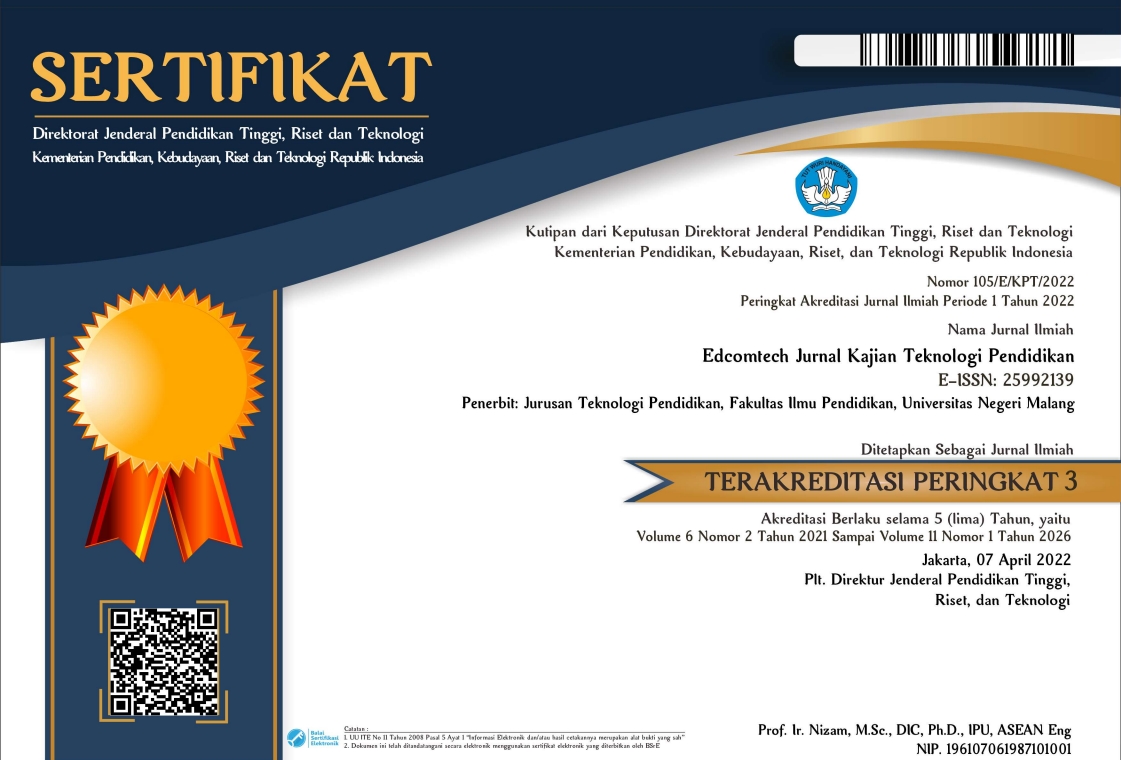



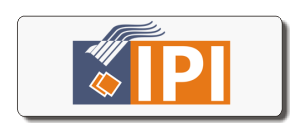





1.png)
